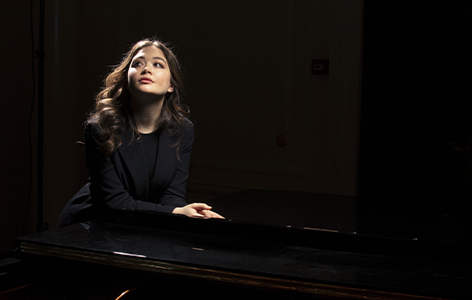
R1 Alexandra Stychkina
Winner of the Marguerite Long Competition in Paris, young pianist Alexandra Stychkina will bring an emotive and virtuosic program to Ostrava. The evening opens with Janáček’s ballad 1 October 1905 and Shostakovich’s Piano Sonata No. 2—two works composed in the wake of tragic events. The second half of the concert will offer a romantic atmosphere of forest nooks in piano cycles by Schumann and Liszt, culminating in Liszt’s famous Hungarian Rhapsody No. 15.
Leoš Janáček
1. X. 1905 (From the Street on 1 October 1905), JW VIII/19
Dmitri Shostakovich
Piano Sonata No. 2 in B minor, Op. 61
Robert Schumann
Forest Scenes, Op. 82
Franz Liszt
Forest Murmurs, S.145/1
Franz Liszt
Hungarian Rhapsody No. 15, S.244/15
Alexandra Stychkina – piano
At just twenty-one years old, pianist Alexandra Stychkina drew major international attention by winning the prestigious Marguerite Long International Piano Competition in Paris in 2019. For her Ostrava debut, she will present two landmark piano works of the 20th century in the first half of her recital.
In the programmatic piece 1. X. 19051 (From the Street on 1 October 1905), Leoš Janáček artistically captured his impressions of the tragic death of worker František Pavlík, who was beaten to death during nationalist clashes between Czechs and Germans at a demonstration for a Czech university.
Dmitri Shostakovich’s Piano Sonata No. 2 was also composed under the shadow of death. It was not only the passing of his piano teacher, Leonid Nikolayev, that provided direct inspiration, but perhaps also the countless deaths on the battlefields of the Second World War, which was raging in 1943 when Shostakovich wrote the work.
The second half of the recital will feature virtuosic pieces by Robert Schumann and Franz Liszt. Like Schumann’s Forest Scenes (1848–1849), Liszt’s Forest Murmurs (twelve years later) was inspired by the poetry, beauty, and also the untamed harshness of nature. In contrast, Liszt’s brilliant Hungarian Rhapsody No. 15 (1853), which includes a quotation of the famous Rákóczi March, responds directly to the political oppression of the Hungarian people under Habsburg rule.


